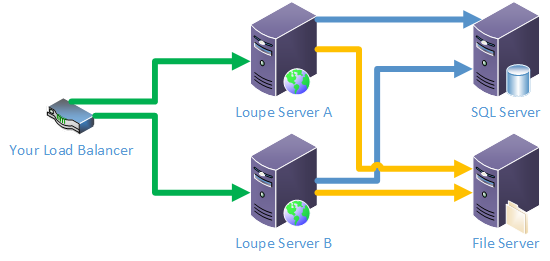Loupe Server Enterprise Edition
Enterprise Edition Supports Clustering and Multiple Teams
Loupe Server Enterprise Edition extends the standard Loupe Server with the following additional features:
- Active Directory Integration: Loupe Server can map to AD groups so that access to log data through Loupe can be centrally managed. For example, when an new hire is added to a particular AD group, they automatically get access to Loupe data and when an employee’s AD account is disabled, expired or locked, they will no longer be able to log into Loupe.
- Multiple Repository Support: A Loupe Server can have many individual repositories that do not share information, allowing individual departments or teams to have their own area without requiring their own servers. User identity is shared across repositories so a single user can open multiple repositories if they are authorized.
- Server Clustering: Multiple servers can act as part of the same Loupe environment, sharing load from users.
- Server Roles: The various Loupe services can be distributed between different servers, allowing for dedicated web UI, transport, analysis, and live stream servers.
- Remote Storage: File storage can be located in multiple external network locations instead of being mounted locally on the Loupe server.
- Storage Pooling: Storage can be added or removed without taking Loupe Server offline. In addition, you have control over how data is distributed across volumes and make configuration changes without bringing Loupe Server offline. This edition is identical to the Loupe Software as a Service system used by Gibraltar Software for subscription customers. The system can be configured in many ways to meet the needs your organization. A typical load-balanced configuration is illustrated below.

Read more on our blog
Our blog includes additional details about Loupe Server Enterprise Edition including real-world examples of how it helps organizations with large teams, demanding data requirements or more control over Loupe Server configuration. We also have a great post describing how our AD integration is more than just logging in.